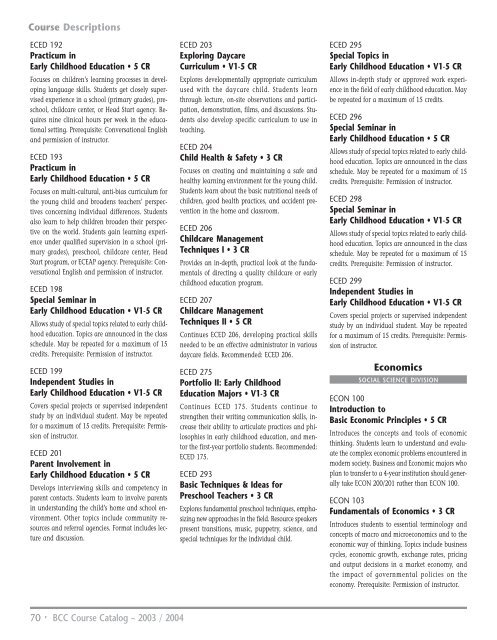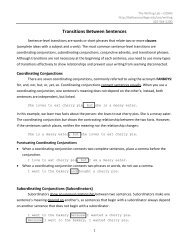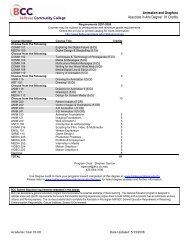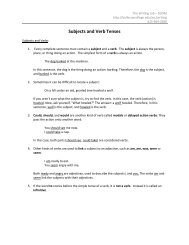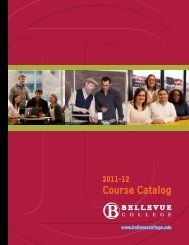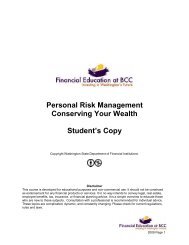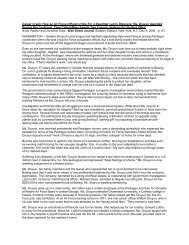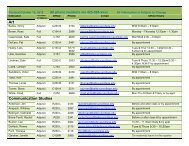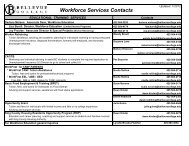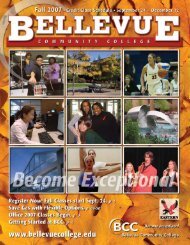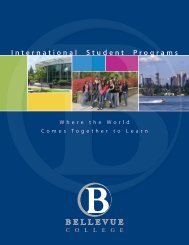2003 / 2004 - Bellevue College
2003 / 2004 - Bellevue College
2003 / 2004 - Bellevue College
You also want an ePaper? Increase the reach of your titles
YUMPU automatically turns print PDFs into web optimized ePapers that Google loves.
Course Descriptions<br />
ECED 192<br />
Practicum in<br />
Early Childhood Education • 5 CR<br />
Focuses on children’s learning processes in developing<br />
language skills. Students get closely supervised<br />
experience in a school (primary grades), preschool,<br />
childcare center, or Head Start agency. Requires<br />
nine clinical hours per week in the educational<br />
setting. Prerequisite: Conversational English<br />
and permission of instructor.<br />
ECED 193<br />
Practicum in<br />
Early Childhood Education • 5 CR<br />
Focuses on multi-cultural, anti-bias curriculum for<br />
the young child and broadens teachers’ perspectives<br />
concerning individual differences. Students<br />
also learn to help children broaden their perspective<br />
on the world. Students gain learning experience<br />
under qualified supervision in a school (primary<br />
grades), preschool, childcare center, Head<br />
Start program, or ECEAP agency. Prerequisite: Conversational<br />
English and permission of instructor.<br />
ECED 198<br />
Special Seminar in<br />
Early Childhood Education • V1-5 CR<br />
Allows study of special topics related to early childhood<br />
education. Topics are announced in the class<br />
schedule. May be repeated for a maximum of 15<br />
credits. Prerequisite: Permission of instructor.<br />
ECED 199<br />
Independent Studies in<br />
Early Childhood Education • V1-5 CR<br />
Covers special projects or supervised independent<br />
study by an individual student. May be repeated<br />
for a maximum of 15 credits. Prerequisite: Permission<br />
of instructor.<br />
ECED 201<br />
Parent Involvement in<br />
Early Childhood Education • 5 CR<br />
Develops interviewing skills and competency in<br />
parent contacts. Students learn to involve parents<br />
in understanding the child’s home and school environment.<br />
Other topics include community resources<br />
and referral agencies. Format includes lecture<br />
and discussion.<br />
70 • BCC Course Catalog ~ <strong>2003</strong> / <strong>2004</strong><br />
ECED 203<br />
Exploring Daycare<br />
Curriculum • V1-5 CR<br />
Explores developmentally appropriate curriculum<br />
used with the daycare child. Students learn<br />
through lecture, on-site observations and participation,<br />
demonstration, films, and discussions. Students<br />
also develop specific curriculum to use in<br />
teaching.<br />
ECED 204<br />
Child Health & Safety • 3 CR<br />
Focuses on creating and maintaining a safe and<br />
healthy learning environment for the young child.<br />
Students learn about the basic nutritional needs of<br />
children, good health practices, and accident prevention<br />
in the home and classroom.<br />
ECED 206<br />
Childcare Management<br />
Techniques I • 3 CR<br />
Provides an in-depth, practical look at the fundamentals<br />
of directing a quality childcare or early<br />
childhood education program.<br />
ECED 207<br />
Childcare Management<br />
Techniques II • 5 CR<br />
Continues ECED 206, developing practical skills<br />
needed to be an effective administrator in various<br />
daycare fields. Recommended: ECED 206.<br />
ECED 275<br />
Portfolio II: Early Childhood<br />
Education Majors • V1-3 CR<br />
Continues ECED 175. Students continue to<br />
strengthen their writing communication skills, increase<br />
their ability to articulate practices and philosophies<br />
in early childhood education, and mentor<br />
the first-year portfolio students. Recommended:<br />
ECED 175.<br />
ECED 293<br />
Basic Techniques & Ideas for<br />
Preschool Teachers • 3 CR<br />
Explores fundamental preschool techniques, emphasizing<br />
new approaches in the field. Resource speakers<br />
present transitions, music, puppetry, science, and<br />
special techniques for the individual child.<br />
ECED 295<br />
Special Topics in<br />
Early Childhood Education • V1-5 CR<br />
Allows in-depth study or approved work experience<br />
in the field of early childhood education. May<br />
be repeated for a maximum of 15 credits.<br />
ECED 296<br />
Special Seminar in<br />
Early Childhood Education • 5 CR<br />
Allows study of special topics related to early childhood<br />
education. Topics are announced in the class<br />
schedule. May be repeated for a maximum of 15<br />
credits. Prerequisite: Permission of instructor.<br />
ECED 298<br />
Special Seminar in<br />
Early Childhood Education • V1-5 CR<br />
Allows study of special topics related to early childhood<br />
education. Topics are announced in the class<br />
schedule. May be repeated for a maximum of 15<br />
credits. Prerequisite: Permission of instructor.<br />
ECED 299<br />
Independent Studies in<br />
Early Childhood Education • V1-5 CR<br />
Covers special projects or supervised independent<br />
study by an individual student. May be repeated<br />
for a maximum of 15 credits. Prerequisite: Permission<br />
of instructor.<br />
Economics<br />
SOCIAL SCIENCE DIVISION<br />
ECON 100<br />
Introduction to<br />
Basic Economic Principles • 5 CR<br />
Introduces the concepts and tools of economic<br />
thinking. Students learn to understand and evaluate<br />
the complex economic problems encountered in<br />
modern society. Business and Economic majors who<br />
plan to transfer to a 4-year institution should generally<br />
take ECON 200/201 rather than ECON 100.<br />
ECON 103<br />
Fundamentals of Economics • 3 CR<br />
Introduces students to essential terminology and<br />
concepts of macro and microeconomics and to the<br />
economic way of thinking. Topics include business<br />
cycles, economic growth, exchange rates, pricing<br />
and output decisions in a market economy, and<br />
the impact of governmental policies on the<br />
economy. Prerequisite: Permission of instructor.


